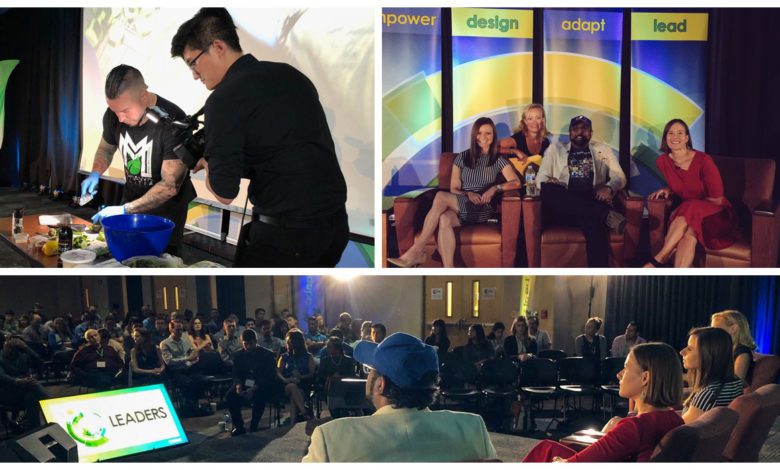
More than 200 engineering professionals gathered in Austin, Texas, from July 26-28, to learn and share the hottest trends in leadership and technology, at the 2018 IEEE-USA Future Leaders Forum. The Forum aimed to inspire attendees, and help them thrive in today’s complex and volatile world. The Forum program explored today’s modern workforce: its different motivators; workplace structures; and new ways of communicating.
Brilliant inventors, passionate entrepreneurs and corporate leaders led keynotes, activities and panel discussions inspired by this year’s theme: Lead, Empower, Adapt and Design. With topics as diverse as risk-taking and decision-making; or improv and professional fashion, the Forum included something for everyone.
Events kicked off with a career fair, featuring representatives from such industry leaders as Raytheon, Arm, Samsung, Schlumberger, Mercer, TECO Westinghouse, and more. IEEE Young Professionals offered advice on personal branding and interview skills, plus professional headshots for all who signed up.
Evening activities featured a dinner and reception at the Bullock Texas State History Museum. Following some delicious local Tex Mex cuisine, and a brief speech by IEEE-USA President Sandra Robinson, attendees broke into groups. They had the museum to themselves for a trivia hunt, and learned more about IEEE, as well as the great state of Texas.
On Day Two, the first keynote speaker took the stage: professor, physicist and inventor Larry Hornbeck. Hornbeck won an Oscar for creating Digital Micromirror (DLP) technology, the backbone of modern digital cinema. He talked about overcoming challenges, and not being afraid to fail: “If you’re afraid you may fail, then your actions may not be as bold, aggressive, or creative as you need them to be, to accomplish your goal.”
Next, Dr. Gloria See hosted a design panel about how to shape the future for yourself and the next generation. See believes that we must redefine expectations, as well as the way we expose all young children to engineering—both boys and girls. “Not every child should grow up to be an engineer. But they should all have that choice,” she explained. Further,
Panelist Natalia Baklitskaya encouraged everyone to get involved. “You can’t complain about the way the world is, if you just sit back and do nothing,” she said.
After lunch, participants had several session options:
- Wardrobe stylist Hannah Rose Marie gave tips on professional attire. She said that “fashion is a non-verbal language.” Studies show that someone can appraise you within the first seven to 30 seconds of meeting you, and your appearance is a major part of that.
- Ajay Bhargava showed off the magic of data analytics, including overcoming data quality challenges and constraints in building models from open datasets.
- Nancy Martin imparted wisdom on perfectionism, and the power of letting go. She taught that perfection is unachievable. You can be happier and more successful by learning to recognize and accept what is good enough, instead of chasing an unrealistic ideal.
- Chan Wong shared a passionate take on career development, and the value of volunteerism. He discussed how his engagement with a professional association has given him a platform to improve his leadership, management skills and career development.
- Natalia Baklitskaya and Bryan Cover led attendees through a hands-on maker workshop that included Arduino microcontrollers and wearables, with small groups taking on demo projects.
After a quick break, it was time for a new set of topics:
- Christiane Michaelis showed the importance of thinking outside the box. Creativity and innovative thinking are becoming the most sought-after skills for business, and can help give you and your company a competitive edge.
- Aisha Yousuf hosted the Working Across America panel, leading a discussion on what it’s like to live and work in different parts of the country, or to telecommute from home.
- Danielle Piper’s Diversity and Inclusion panel sought to increase attendees’ understanding of diversity. The panel examined implicit bias—and how it negatively influences inclusion in many sectors.
- Steve Skarke taught attendees how to unlock their leadership potential. Skarke discussed the difference between management and leadership, the fundamentals of leading, and five practices of exemplary leaders.
- Improv may not be the first word that comes to mind when you think of engineering, but both depend on similar skills, including critical listening, empathy in a team, and incremental progress. Mike Mournighan and Shawn Davis helped attendees exercise their funny bone, working together with a series of high-energy improv games.
In the evening, the Future Leaders Forum took over historic Scholz Garten—with food and beverages, corn hole games and bowling. In addition, The Motts, a great local band, provided some excellent music, on a warm Austin night.
Day Three got off to a great start, with Steve Sasson’s keynote presentation. Sasson invented the first digital camera. One of the world’s great innovators, Sasson implored attendees to “lead the change you want to see right now,” and he counseled them not to be afraid of failure or rejection. “Most of the people who reject you and your ideas are jealous of you,” he said, and “Be bold!”
Danielle Piper returned to the stage to host the lead panel about taking risks and embracing new ideas. Panelist Samantha Snabes said, “Never give up on your dreams. You may not go into space, but maybe you’ll take a 3D printer where no one has gone before.”
Nancy Martin’s Adapt Session discussed the challenging times when one must adapt and evolve to survive. She emphasized that “Adapt does not mean conform,” but rather to grow and learn to change ourselves, or even the world around us, as times and expectations change.
Futurist, author and filmmaker Maxim Jago took the stage for the third keynote, combining practical philosophy and wisdom from multiple cultures and ages. Jago talked about decisions, and their consequences. He touched on the importance of empathy, and really listening to one another: “When someone has a problem, the first thing they need isn’t a solution, it’s to be heard.”
At the Empower Panel, Rob Vice led a conversation about the importance of empowering yourself and others, creating a supportive environment to thrive in, and realizing your untapped potential. Panelist Michael Junge talked about what an empowered environment looks like: “If something useful needs doing, don’t wait to ask for permission.”
Chef, philanthropist and entrepreneur Patrick Stark delivered the final keynote, sharing how he found his life’s purpose—and he offered up a delicious, healthy snack recipe, with the help of two volunteers. And he capped off the final evening with a rousing musical performance.
IEEE-USA extends a big thank you to all who attended the Forum, as well as to our speakers and volunteers. We hope you found your time in Austin inspiring, educational and fun, and we look forward to seeing you at the Forum next year!
Corey Ruth is IEEE-USA’s media relations associate.






